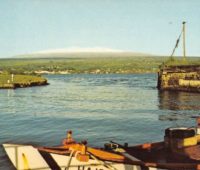In the first essay in the “Ways of Water” series, Hiʻilei Julia Hobart explores the qualities of water that are also representative of diasporic experiences. Shallows and tides, among other forms, in their relationship to lands as well as other bodies of water, offer a significant scope through which to better understand and imagine the present and the future in a time of anthropogenic climate change. Rather than stasis, these water worlds help us re-imagine life as flows, and floes, where humans are not at the center, but one part of a shifting complex whole. These lessons, drawn from Indigenous and decolonial art and thought, suggest pathways forward to promote “praxis of care” that is local-grounded, but can encompass a perspective of planetary well-being.













